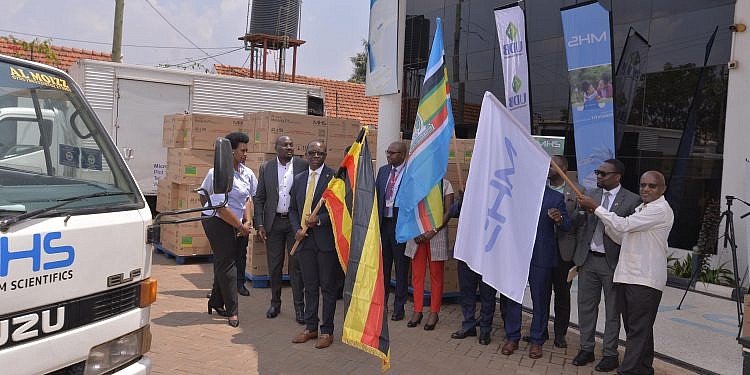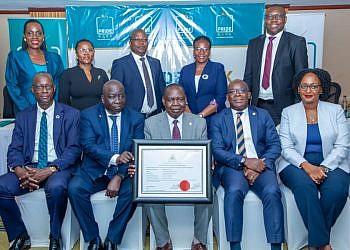The Ministry of Health has flagged off the first batch of locally manufactured Malaria test kits to the National Medical Stores.
The kits are manufactured by Microheam Scientifics(MHS) premised in Ntinda with a capacity to produce up to 80 million kits for malaria or a month per production line.
Speaking during the flag off on Monday, Dr. Daniel Kyabayinze, Director of Public Health at the Ministry of Health said by manufacturing the kits locally, the challenge of fake kits and diagnostic gaps will be addressed.
“There are fake kits that wrongly diagnose people, putting lives at risk. We must ensure only high-quality, verified diagnostic tools are available,” Dr. Kyabayinze cautioned.
Uganda receives $350 million in funding from the Global Fund every three years, with a significant portion allocated to medicines and diagnostics.
However, the country’s demand for diagnostics in the public health sector alone is estimated at $200 million per year, while available funding covers only $117 million, leaving an annual gap of approximately $83 million.
Dr. Kyabayinze highlighted that between 12 to 14 million people are tested for various diseases annually in Uganda, with nearly half of the population undergoing malaria tests each year.

He noted that the availability of locally manufactured test kits will help lower costs, as private health facilities currently charge about shs5,000 per malaria test.
Dr. David Nahamya, the Executive Director of the National Drug Authority (NDA), hailed the project as a historic achievement for Uganda and the region.
“This is Uganda’s first facility of its kind, and in the region. The WHO has commended the quality of our kits,” Nahamya said.
“This is the first plant in East Africa to locally manufacture diagnostic kits, and it meets all quality standards both locally and internationally.”
Dr. Cedric Akwesigye, Managing Director of MHS said the new diagnostic tests manufactured by MHS are a complete package and a replica of a laboratory, eliminating the need for healthcare providers to buy different testing accessories as is currently on the market.
Each kit will cost less than $1, significantly lower than imported alternatives that retail for around $1.5 and above.
“The test kits people can now test themselves conveniently without requiring a healthcare provider,” Dr. Akwesigye noted .
He said MHS has current capacity to produce 85 million testing kits annually and that the Ugandan government, through the National Medical Stores (NMS), has placed an initial order for four million test kits, covering 30% of Uganda’s annual demand.
At the same function, Uganda Development Bank (UDB) announced it has provided $7.5 million in funding to support the project.
UDB Managing Director Patricia Ojangole emphasized the importance of long-term investment in local manufacturing.
“This milestone is a testament to Uganda’s remarkable potential in healthcare manufacturing. We are committed to supporting enterprises that enhance our health system,” she stated.
Equity Bank has also pledged continued financial backing. “We started this partnership six months ago to support the manufacturing sector. We commend the work done so far and commit to supporting MHS to close the funding gaps.








































